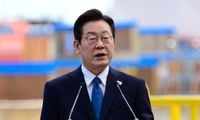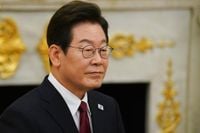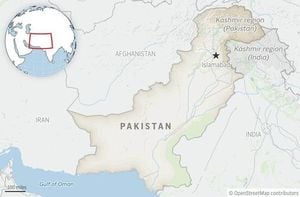In a dramatic turn of events that has sent ripples through international business and diplomacy, the United States' recent immigration raid on a major electric vehicle battery factory construction site in Georgia has ignited tensions with South Korea and cast uncertainty over billions of dollars in planned investments. The incident, which unfolded on September 4, 2025, saw U.S. authorities detain 475 workers—of whom 316 were South Korean nationals—at the Hyundai Motor Co. and LG Energy Solution Ltd. joint venture site in Bryan County, Georgia. The crackdown, part of a broader U.S. effort to police illegal immigration, has drawn sharp reactions from Seoul and left the future of key economic partnerships hanging in the balance.
According to Bloomberg, South Korean President Lee Jae Myung did not mince words in a press conference marking his first 100 days in office. “They only needed skilled technicians to install equipment for building the plant because there’s no available labor in the U.S.,” Lee said on Thursday, expressing surprise at the raid. He warned that the episode could have a significant impact on future direct investments into the U.S., a sentiment echoed throughout South Korea as images of handcuffed workers spread rapidly online, fueling public outrage and putting pressure on his fledgling administration.
The workers, who were brought in to install specialized equipment at the sprawling battery facility, found themselves swept up in the raid during a period when U.S. visa approvals for such technicians had been repeatedly denied. Most of those detained held legal tourist or temporary entry visas, or had entered under the U.S. visa waiver program, according to the U.S. Immigration and Customs Enforcement (ICE). Still, the authorities classified their presence as a violation of immigration laws, leading to their abrupt detention and transfer to the Folkston detention center in Georgia.
The fallout from the raid was immediate and far-reaching. As reported by Vietnam News Agency (TTXVN), South Korean Foreign Minister Cho Hyun quickly traveled to the U.S. for urgent talks, meeting with House Majority Leader Marco Rubio at the White House on September 10, 2025. The Korean side demanded the swift release and repatriation of the detained workers, assurances that future visits by Korean technicians would not be hampered, and consideration of a new visa category tailored for such skilled labor.
By Thursday afternoon, September 11, 2025, the 316 South Korean workers had been released from detention and were transported to Atlanta’s airport, where they boarded a charter flight back to Seoul. They were expected to arrive in South Korea by the afternoon of September 12. The U.S. reportedly agreed not to hinder these workers’ re-entry in the future and to review the possibility of new or expanded visa categories for Korean investors and technicians, according to South Korean officials.
The incident comes at a particularly sensitive time for U.S.-South Korea relations. Just two weeks prior, President Lee and U.S. President Donald Trump had held a summit reaffirming their economic and security partnership. Yet, as Bloomberg notes, the relationship has been strained by unresolved trade issues, including a July 2025 agreement that maintained a 15% tariff on most Korean imports and left questions about U.S. auto tariff reductions and a $350 billion South Korean investment commitment hanging in the air.
President Lee, in his remarks, did not shy away from the broader economic implications. “This could have a significant impact on future direct investments into the U.S.,” he cautioned, warning that South Korean companies might reconsider or scale back their expansion plans if such incidents persist. The sentiment was echoed by business leaders and government officials alike, who fear that the perception of a hostile regulatory environment could deter the very foreign investment the U.S. is seeking to attract.
“We still have a long way to go in the negotiations,” Lee acknowledged, emphasizing that, despite the seemingly harsh and unreasonable conditions at first glance, a rational and mutually beneficial agreement must ultimately be reached. “What may seem rough, excessive, unreasonable, even absurd on the surface, the final conclusion will be made reasonably, and we must ensure that.”
For South Korea, the stakes are high. Under the July trade framework, Seoul has pledged a staggering $350 billion in investments in the U.S., a commitment that underpins much of the current economic cooperation between the two countries. Key projects, such as the Hyundai-LG battery plant in Georgia, are at the heart of this strategy, promising to create thousands of American jobs and bolster the U.S. supply chain for electric vehicles—a sector both governments have identified as critical for future growth.
Yet, as the raid demonstrated, the devil is in the details. The acute shortage of local skilled labor in the U.S. for such advanced manufacturing projects means that Korean firms have little choice but to bring in their own technicians, at least for the initial installation and setup phases. Without a clear and reliable visa pathway for these workers, companies face the risk of operational disruptions and legal entanglements, threatening timelines and eroding confidence.
The episode has also touched a nerve in South Korea, where images of handcuffed compatriots have struck a chord and fueled public anger. Many see the detentions as heavy-handed and disproportionate, especially given the workers’ legal status and the broader context of mutually beneficial investment. The controversy has overshadowed President Lee’s early tenure, casting a shadow over his efforts to position South Korea as a trusted partner and major investor on the global stage.
Meanwhile, U.S. officials have found themselves walking a fine line. On one hand, the Biden administration (and now Trump’s, according to the timeline) faces domestic pressure to enforce immigration laws and protect American jobs. On the other, it is keenly aware of the importance of foreign investment—particularly from allies like South Korea—in revitalizing U.S. manufacturing and maintaining technological leadership. The ICE’s acknowledgment that most detained workers held legal visas underscores the complexity of the issue and the need for policy solutions that balance enforcement with economic realities.
Negotiations between Washington and Seoul are ongoing, with both sides expressing hope for a resolution that safeguards investment flows and addresses legitimate labor and security concerns. South Korea, for its part, has requested not only the normalization of visa issuance for investors and technicians but also the creation of a new visa category that reflects the unique needs of large-scale industrial projects. U.S. officials have indicated a willingness to consider these requests, though concrete changes remain to be seen.
As the dust settles, the incident serves as a stark reminder of the delicate interplay between immigration policy, economic strategy, and international relations. For now, the released workers are on their way home, but the larger questions about how the U.S. and its partners manage the movement of skilled labor—and the investments that depend on it—remain unresolved. The outcome of these negotiations could well determine the next chapter in the economic partnership between two of the world’s leading industrial powers.
With so much at stake, both sides are under pressure to find common ground. The world will be watching closely to see whether this crisis becomes a footnote in a flourishing partnership or a sign of deeper fault lines ahead.





